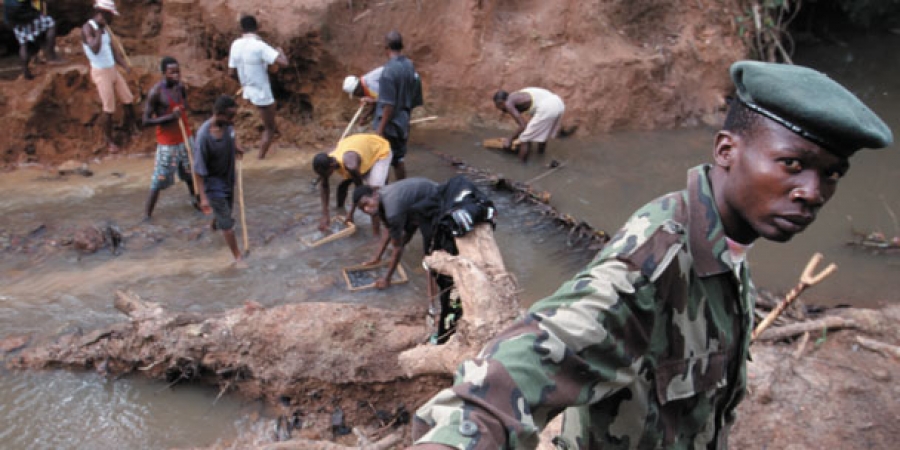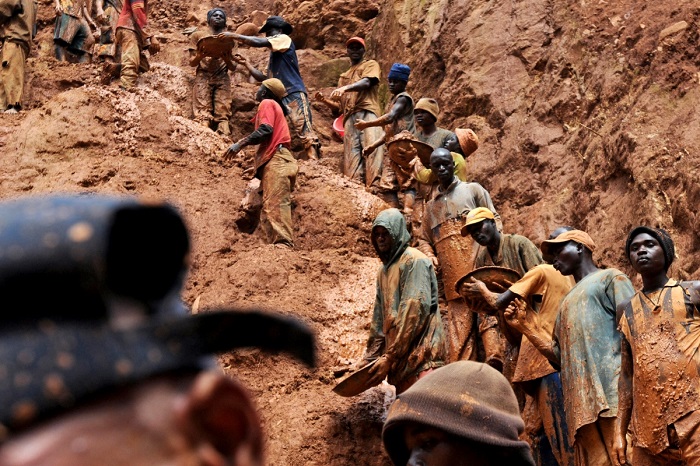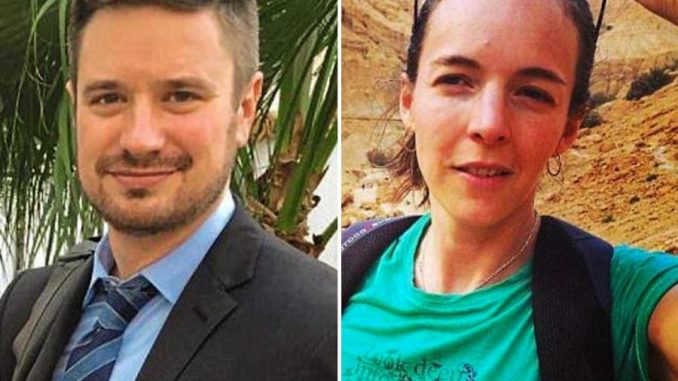
The decades-long conflict in the Congo around minerals, militias, and political power has cost the lives of millions.
Among the latest victims were UN Group of Experts investigators Michael Sharp and Zaida Catalán, who were murdered in March of this year while conducting research in the Congo for a UN report on political and militia violence.
The death of these investigators has drawn new attention to Western complicity in the conflict and how much the UN is truly working for peace in the region.
Politics and Profit
The UN Security Council has sent a Group of Experts into the dangers of the Congo since 2004 to investigate the illicit trade of minerals and arms.
Congolese analysts at the Washington DC-based social justice advocacy organization Friends of the Congo say that some members of the UN Security Council, particularly the US, have often turned a blind eye to the powerful players exposed by the UN Group of Experts. This has particularly been the case when UN reports implicate neighboring nations of Rwanda and Uganda and their support for violent militias operating in the Congo.
The US tendency to ignore the root causes of instability in the DRC has exacerbated the crisis in the country. Friends of the Congo believes Washington’s unwillingness and selective approach toward foreign policy in the nation stems from its interest in securing corporate access to conflict minerals.
The US recognizes Rwanda and Uganda as two of its strongest African strategic partners and gives both nations tens-of-millions in foreign aid, some of which goes to support, train, and arm both nations’ militaries. Rwanda and Uganda also work with the US as a major trading partner.
Yet in 2012 both Rwanda and Uganda were implicated by a Group of Experts investigation for providing direct military and financial support to an eastern Congolese militia. In this case, the countries were connected to the M23 rebel group which the Group of Experts accused of killing hundreds of civilians, widespread rape, utilizing child soldiers, and the smuggling of conflict minerals.
According to Human Rights Watch and other Congolese experts, Susan Rice of the Obama administration and then-US ambassador to the UN first tried to delay the Group of Experts report that alleged these ties between M23, Rwanda and Uganda. Then she tried to block naming Rwanda and Uganda in a UN Security Council resolution that was initiated by the same Group of Experts report.
The father of the late Michael Sharp has heard the criticisms against the UN and its mission in the Congo. But because his son’s life’s work was spent trying to bring peace to the Congo, he’s witnessed the UN’s efforts there practically firsthand. He wholeheartedly believes the UN and its Security Council are doing all they can to bring peace and stability to the Congo.
“Peace making is messy. There are failures here and failures there,” John Sharp, Michael’s father, told Toward Freedom. “But if you take the long view, it is better than more violence. That’s kind of the way I view it too. You can keep trying and keep trying and keep trying, and they will make mistakes. And they will do things very well. But the UN is committed to it. They are deeply committed to the DRC.”
Michael Sharp and Zaida Catalán were murdered in March of this year in the Kasai-Central province while investigating a lead that a Congolese military officer had allegedly ordered the massacre of civilians, says John Sharp.
Initially, the UN stated those responsible for the death of Michael Sharp and his partner Zaida Catalán were likely members of Kamuina Nsapu, an anti-government militia which originated in the Kasai provinces, not far from the government’s seat of power in the capital of Kinshasa, where much of the Congo’s recent round of unrest has unfolded.
There is evidence, however, suggesting the murderers were soldiers from the Congolese military and the UN is investigating this possibility.
The Culture of Impunity

Kambale Musavuli, a spokesperson for Friends of the Congo, is a friend of John Sharp’s and says the UN’s Group of Experts in the Congo have done “stellar work” to uncover the causes of instability in the region.
The Group of Experts’ investigations have exposed violent militias that have illicitly traded Congo minerals to Western-based corporations and mining brokers, Musavali told Toward Freedom. They have also unmasked the roles of neighboring nations Rwanda and Uganda, which have looted Congo’s natural resources by secretly backing violent Congolese-based militias for nearly two decades.
According to the UN, another Group of Experts – usually several investigators whose expertise can range from arms trafficking, to finance, to humanitarian issues – is preparing for deployment to the Congo. Among other directives, the UN Security Council sends its Group of Experts to the Congo to investigate human rights violations by both militias and DRC security forces, and explore if these groups are involved in the illicit trade of minerals and arms.
The Group of Experts risk their lives in their work, and in some cases lose their lives. The deaths of Sharp and Catalán highlight the danger of such investigations, particularly at a time of increased political turmoil.
The Congo is teetering on the brink of civil war once again as President Joseph Kabila refuses to step down, even though he was constitutionally mandated to do so when his second term ended this past January.
Musavuli believes the UN’s ineffectiveness in the Congo stems in part from how the UN Security Council has responded to their own Group of Experts when they return from the Congo with their findings.
“When these reports are published,” explained Musavuli, “these reports provide recommendations to member states of the UN, and it’s up to the member states to implement the recommendations. What has been consistent with these reports is that some of the member nations, specifically the Security Council [five permanent members being the US, France, the UK, China, and Russia], have been unwilling to stop the culture of impunity.”
“There is a culture in the Congo where no one is held accountable for crimes committed in the Congo,” Musavuli continued. “When a rebel leader on the ground massacres civilians, nothing happens. When the president of the Congo refuses to respect the constitution, nothing happens. When an international corporation loots the Congo’s natural resources, nothing happens.”
Musavuli says a clear example of the UN Security Council’s uneven and questionable approach was Susan Rice’s alleged effort to censure the Group of Experts 2012 investigation into ties between M23 and Rwanda and Uganda. White House aides at the time admitted Rice was a good friend of Rwanda President Paul Kagame and also a client of hers when she worked at Intellibridge, a strategic analysis firm.
Kagame is credited with ending the 1994 Rwanda genocide, and his connection to the US is well documented. In the 1970s, Kagame trained at the US Army Command and Staff College at Fort Leavenworth in Kansas, and remains good friends with Bill Clinton, Bill Gates, and Warren Buffet.
Musavuli believes the US backs any African leadership which supports international mining corporations and mineral brokers, which is why Washington has continued to support President Kabila for the past two decades, even when elections were clearly rigged.
“The US supports Kabila because he has provided unfettered access to Congo’s resources,” says Musavuli.
Joseph Kabila took power in 2001 after his father Larent-Désiré Kabila was assassinated. In the aftermath of the 1994 Rwandan genocide, the father, leading a militia against the Congo’s president at the time, took power of the DRC in 1997. To fund his ascendancy, the father made a multimillion-dollar deal with US-Canadian corporation American Mineral Fields to extract copper and cobalt from a mine in the mineral-rich eastern Congo, which his militia controlled.
Since 2001, Joseph Kabila, his family and his Congolese allies, have enriched themselves instead of their own people by making similar deals to international mining corporations. A 2017 investigation by Global Witness found only six percent of DRC’s annual mining exports reach the national budget, despite Congo having some of the richest mineral deposits in the world.
Corruption by the Kabila cabal and one of its latent strategies for selling-out Congo minerals, gold and diamonds, were revealed in the 2015 leak of the Panama Papers, which detailed an international web of shell corporations and tax evasion.
In its research into these leaks, the African Network for the Center of Investigative Reporting (ANCIR) found that the “externalization” of billions of dollars from the DRC that enriches a small number of Congo nationals and foreign nationals is achieved through a simple process. A DRC mining asset (such as a copper mine) is sold to an offshore entity, which then sells it at a massive profit to another entity. The new owner raises financing through a Western-based stock exchange to manage the mine.
These deals, states ANCIR, have cost the DRC billions in revenue. This is in a nation with one of the highest child mortality rates and millions of children out of school.
The DRC currently ranks 176 out of 187 nations on the United Nations Human Development Index, which measures per capita income, life expectancy, and education.
The UN’s Complicated Mission

John Sharp has lived through the worry and nightmare of what a Group of Experts goes through when investigating in the Congo.
Sharp has met with the UN Security Council about his son’s murder and wants to make it clear that any claim stating his son was murdered by Kamuina Nsapa are premature.
“The evidence is inconclusive and it is still possible the Congolese government was involved or somebody in the government was involved because this was clearly premeditated and planned,” he told Toward Freedom. “Any conclusions reached are premature and inconclusive.”
Michael Sharp and Zaida Catalán, he says, had provided evidence to the UN that a commanding officer in the Congolese military had allegedly ordered the massacre of civilians and blamed it on the anti-government militia Kamuina Nsapu. Sharp and Catalán had agreed to meet with the Kumuina Nsapa leadership regarding this issue, as well as to investigate the militia’s structure, support networks, use of child soldiers, and use of magic, which militia members believe will protect them from being killed in battle.
“Why would [Kamuina Nsapu] have any reason to prevent their coming if they had agreed to it? They were expecting them to come. MJ [Sharp] had cleared the way for them to come, but never did,” John Sharp explains.
He also questions the video of the murder, and wonders why the militia would take a video in the first place.
“The video is too neatly done. It doesn’t look like militia members in the video. It’s too polished and clean,” he says.
What’s more, he adds, the murderers were speaking in Lingala, the language associated with the Congolese military.
The Congolese government, which obtained the video first and showed it to journalists, blamed Kumuina Nsapa. Sharp asks, “Where did they get the video?”
Toward Freedom asked Sharp about the Friends of the Congo’s belief that the UN Security Council has not responded strong enough to its own Group of Experts findings in the Congo.
Sharp said he does not have enough information to answer the question directly, but he believes his son’s death will bring more attention to the UN’s two-decade mission to bring stability to the Congo.
“What we’re saying,” he says, “is ‘Okay, for once, we believe more eyes of the world are focused on the DRC because of these two murders.’ So, let’s use this as a doorway into the larger problems into the DRC, a bushel basket of complexities. There’s human rights violations, there’s fighting over minerals, gold and diamonds, in addition to what we use in our cell phones. It’s just so very complex and MJ [Sharp] would have said that too.”
“He loved the people and was deeply committed to finding solutions to the violence in the Congo,” Sharp concludes. “He obviously gave his life to it, for it. And now we, for those who can longer speak, are trying to advocate for the same thing. It’s also true that millions have died in the Congo and yet so much is being made of these two white people that were killed, and I know MJ would see the irony in it.”
Originally from Buffalo, NY, John Lasker is a journalist residing in Ohio. Lasker has been producing investigative reports for TowardFreedom.com for over seven years, breaking stories on topics such as US corporate ties to resource conflicts in Africa and the race to militarize space. His reporting on sexual violence against women in the military won a 2013 Project Censored Award.
